You Bring Your Grief to the River
Learning equanimity in a time of detention centers, masks, and fear
You bring your grief to the river—the cruelty, the masked men, the fear. You bring it to the river and the river says, Shhh, sweetheart. You’re okay.
The river is unbothered. Not because it doesn’t love, but because it is love.
Vast. Patient. Indifferent to your anxiety or what is happening in the news. The river invites your stillness, your presence. It is profound medicine.
You know you are guilty of the human tendency to trade the present for the siren song of the future. To deem this moment inferior. Less pleasurable, less important, less beautiful, less worthy of your attention.
You know that you, like most people, live your entire life this way.
In two months you’ll be moving to Portugal, and the gravitational force of this event makes it easy for you to think of these last weeks in New York as a throwaway, just killing time until your real life starts.
It would be easy to think that where you are matters less than where you will be going, simply because one is now and the other is still illusion. Fantasy.
Ram Dass once told a story of a woman walking toward a bus stop as the bus was arriving. She could easily have sped up to catch it but she continued at her leisurely pace and the bus came and went without her.
Someone nearby noticed and said, The bus was coming, why didn’t you run to catch it? The woman said, Why would I hurry to get somewhere else when this moment is as worthy as any other?
A radical concept in the U.S., where every moment must be optimized, monetized, squeezed.
It is in this spirit that you’ve been trying to enjoy your summer in New York, almost as a tourist would, appreciating what is uniquely here with the bittersweetness of impending loss.
What you’re most sad about losing is your relationship with this river. The Hudson. Your small section of it, framed by the edges of your u-shaped apartment building.
The river is the main character in your landscape, an anchor in a world that feels like it’s speeding up, rushing toward darkness with a velocity your body can’t digest.
The Masked Men
This makes you dizzy, and angry, and scared. The reports of people dying in detention centers. The inhumane conditions.
The other day it was reported that a woman in ICE custody miscarried and was forced to go three days with her dead baby in her belly, then deliver her stillborn in front of guards who would not look away. Would not give her privacy.
The medical report of the incident stated that the miscarriage was due to lack of prenatal care.
Iris, that is her name.
You keep thinking of Iris. Thinking about the guards.
Not just the guards in that room. All over the country. The ones in unmarked uniforms and masks, pulling people off the street. Dragging protesters into vans, then vanishing again into anonymity.
Who are they? No names. No faces. No consequences.
And you can’t stop thinking about Philip Zimbardo, the famous psychologist.
Your chiropractor, oddly, is his grandson. Months ago, when you were lying on his table with a migraine, he asked what you did and you said you were a therapist. He was shocked you didn’t immediately recognize his grandfather’s name.
“You really don’t know who my grandfather is?” he asked. “The Stanford Prison Experiment?”
You looked it up that night. You remembered.
Zimbardo took a group of ordinary men—college students—and randomly assigned them to the roles of guards and prisoners in a simulated jail. Within days, the guards became sadistic. The prisoners broke down.
Zimbardo had to end the study early. It had gotten too real, too fast. That was 1971.
You think about what happens to a man when you put him in a mask. When you give him a role. When you remove his name, his accountability, and surround him with others playing the same part.
What happens when the mask isn’t just on his face, but in the system itself? Every layer anonymized, outsourced, denied?
Is it the man who is cruel? Or the mask? Both?
What your fear, what makes you sick, is that they’re building systems that generate cruelty by design. Scripting people into sadism and giving them the costume for it. Like the Stanford Prison Experiment, but nationalized, weaponized. And real.
And no one is stopping the experiment.
So you go to the river. Because the river isn’t cruel. The river is love.
A Lifetime of Hypervigilance
The river, like you, has many moods. You track its moods like you track your own.
You’ve become close friends, though unlike you, the river never resists. The river flows, no matter the weather, no matter what it is carrying, because this is what rivers do.
In this way, the river has become your guru.
The river’s invitation is for stillness, and amidst the march of horrific news each day, it is your medicine.
You’ve never not been anxious, not as long as you can remember. But especially now, and you can feel the collective anxiety of this moment because you’ve been tuned so long to the frequency.
In your nursery school class photo, every student is smiling but you. You are in tears because they brought in a clown to make the class laugh and you are the only one who did not think it was funny.
You are the only one who understood the clown to be terrifying and there to kill you. You don’t know if you were crying because of this obvious fact or because no one else seemed to notice. You were, you realized, completely, inconsolably alone in the universe, a new revelation for you.
Was your anxiety causing you to have less fun than everyone else? Yes. But would your hypervigilance for threats lead you to survive the Clownpocalypse of Yellow Duck Nursery School? Yes.
You were sure of this, and still are, deep down, which, you know, is an issue.
It is with this affliction that you come to the river.
The river doesn’t quiet your thoughts, it makes them irrelevant. The loop slows. The loop forgets itself.
The River Resists Nothing
Something happens when you stare at the same stretch of river again and again, every day. You start to learn its lessons. The lack of variability in the boundaries of the landscape is a gift. It allows subtle changes to reveal themselves.
Light, color, the texture of the water, the shapeshifting of the clouds.
The river teaches you about contraction and expansion, about the rhythm of seasons that mirrors the rhythm of a life.
In the winter, the lush trees lining the banks of the Palisades, across the water in New Jersey, are bare, and through them you can see the face of the rocks, turned white with snow.
The landscape transforms into shades of pale blue and gray. Interminable gray. Months and months of gray. The teeming life of the river quiets. Goes dormant. Becomes something inhospitable.
But still, it remains indifferent. When the temperature drops, sheets of ice drift across its surface, a shifting mosaic of sharp angles and cloudy white orbs.
You resist the cold. You resent the wind blowing off the water, rendering your balcony uninhabitable. You argue with winter like it’s a lover whose mind you might change.
You hate the winter, you hate it, but still you can’t help but recognize the beauty of the landscape, so you take a photo, though you won’t look at it until months later.
Then you’ll notice the way the river resists nothing. The way it flows with the transformation of each moment, day, season.
It occurs to you that the river is an expression of the Divine Feminine. It receives the dense sheets of ice, the battering rain, the barges and tugboats, the sailboats, the kayaks, the loud buzzing jet skis (you call them river bugs), the ducks, the snow, the lightning, the shadows that fall upon its surface when the clouds drift across the sun.
The river receives it all without judgment. Carries garbage and sunlight with the same grace. Lets its edges dissolve into the land when the fog settles in.
It doesn’t grasp. It yields. And in that yielding there is a strength that makes steel look flimsy.
That’s the strength of the divine, fierce feminine. The strength you need to carry with you. To Portugal, to whatever the next moment brings, to when the news becomes unbearable and the world feels like it's fracturing.
A headline you see today on Substack calls a new detention facility being built in Florida “the Auschwitz of the Everglades.”
The phrase shocks you, but only for a second. You think, it’s not even a metaphor anymore. It’s not alarmist. Just a warning no one seems to be heeding.
Sweetheart, That’s Not How This Works
The river just is, and you envy it. You want its equanimity. You need it, especially now.
The river knows what you forget. That nothing stays. That everything is always moving, changing.
You argue with the river, you love to argue with it.
Every time you try to muscle your life into a shape you can control, the river says, Sweetheart, that’s not how this works.
The river teaches you about time. About noticing. To appreciate that each moment is utterly unrepeatable, that the precise combination of light, clouds, temperature, birds and birdsong, will never assemble itself like this again, not exactly.
Some days you step out onto the balcony, moving carefully with your bare feet so as not to get another splinter from the low-quality wooden planks (Cheap build. Capitalism, you think to yourself.)
You rest your hand on the railing. You look out. Some days you are overcome with rapture. Some days the river’s calm infuriates you. Some days just glancing at it for a moment is enough to settle your nervous system.
Some days it’s just your old friend. Hey friend.
And some days, your heart is simply too closed to let any of it in. You walk back inside, shut the door behind you like a petulant child.
But the river will be there in the morning. It always is. Moving south, toward the harbor, carrying everything it has received.
If you liked this, please like, share, comment, and restack!

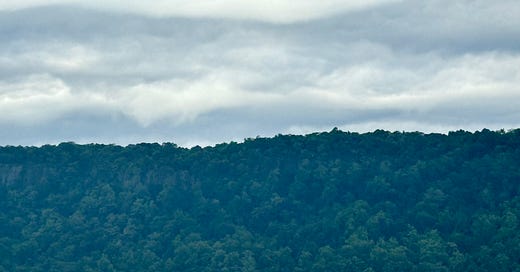





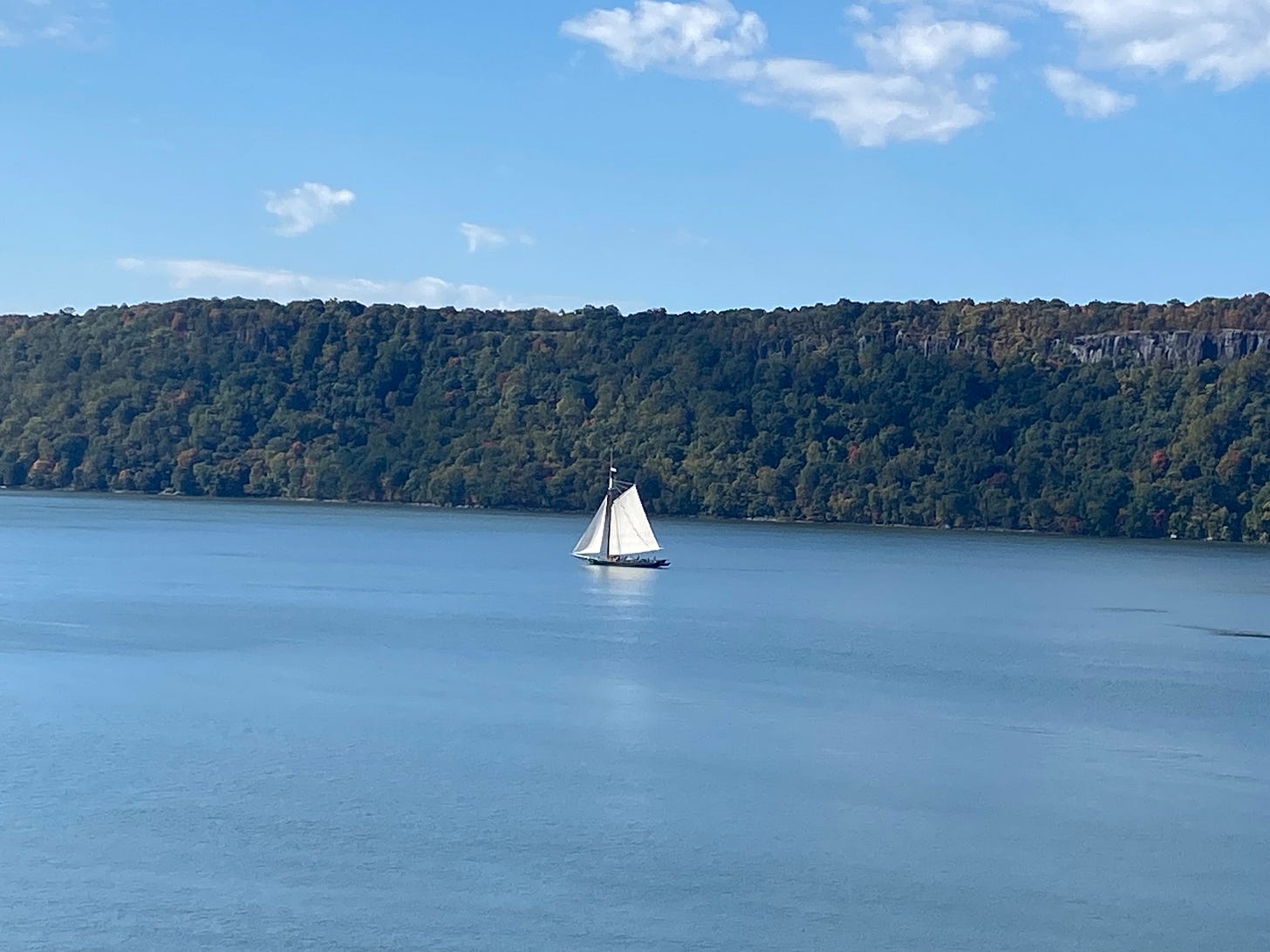
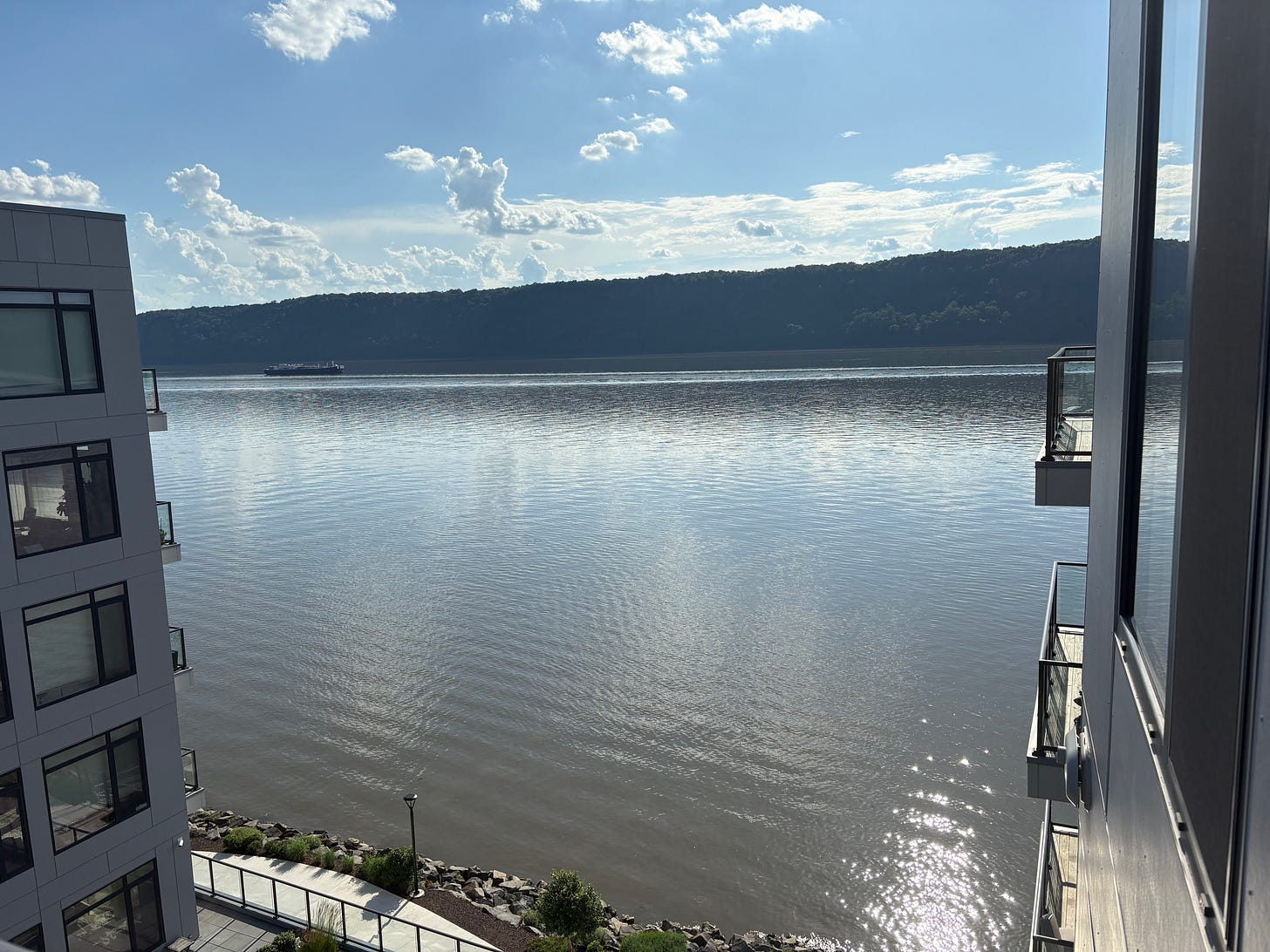
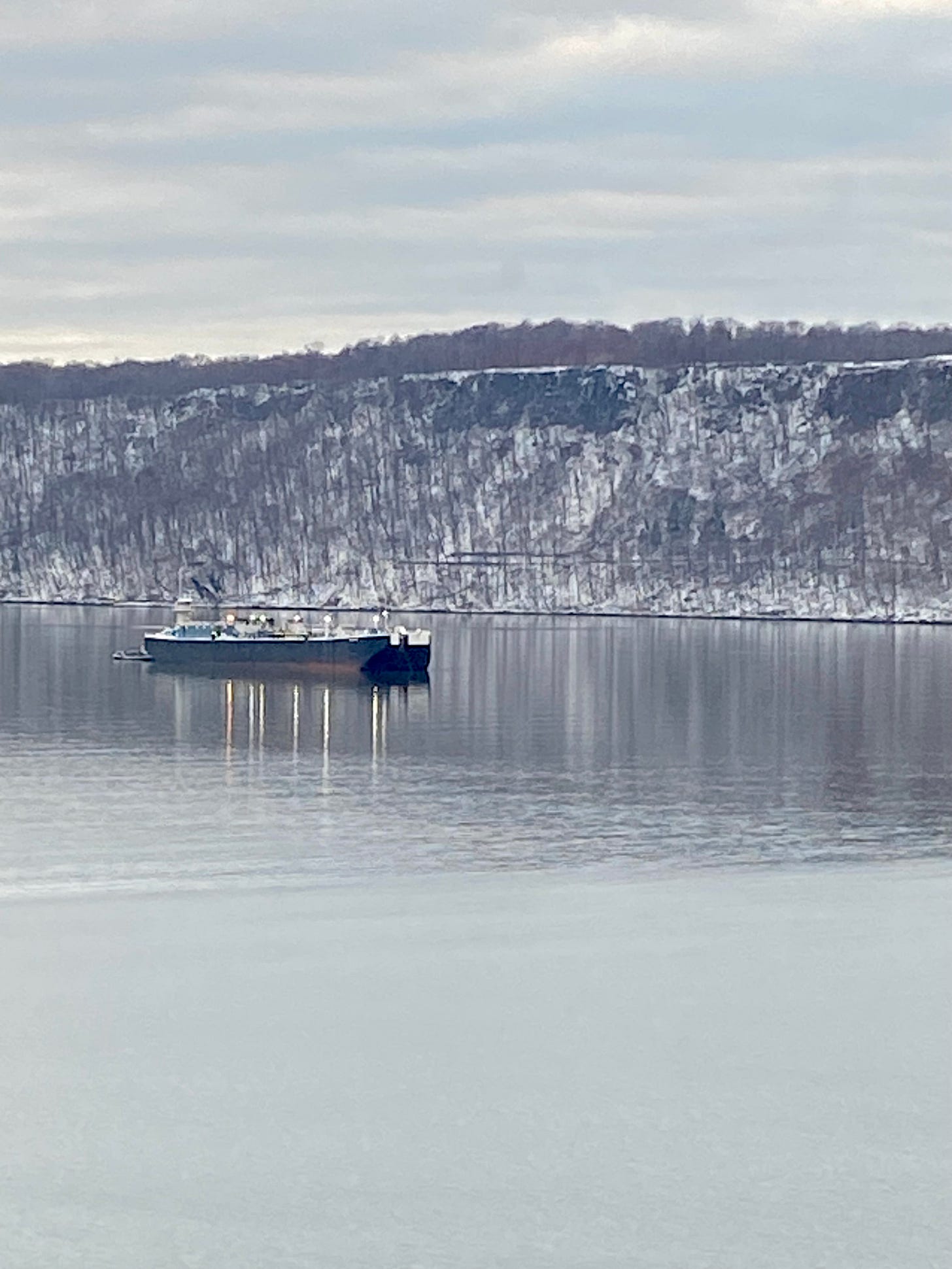

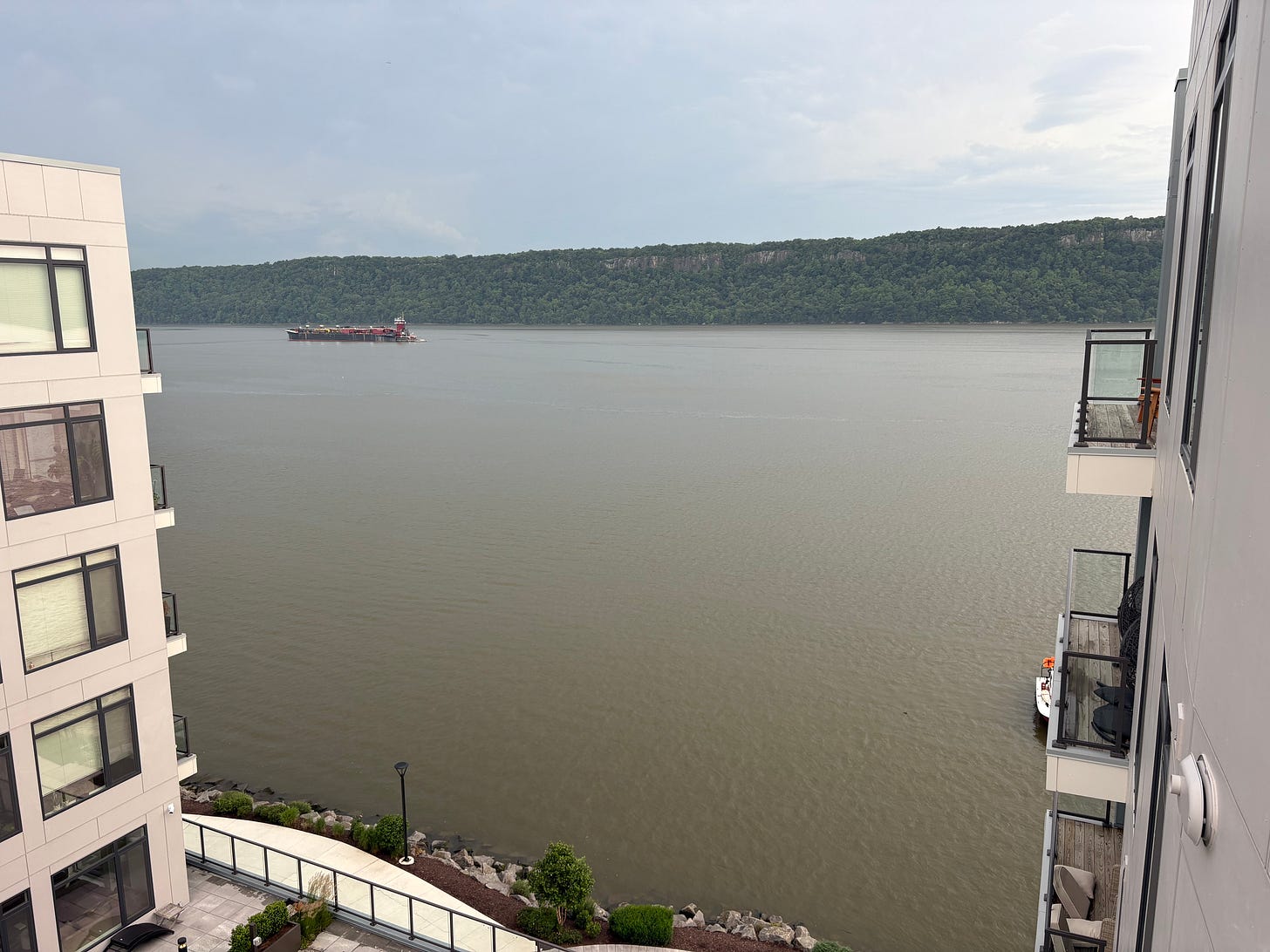


Beautiful tribute to the Hudson. She is a steady and wise thing that saved me more than once from myself. Also, the clownpocalypse is what we can call the current administration when we are needing to satirize for survival.
just beautiful. I used to live in Yonkers and know and love that section of the river very well - although I'd guess you're a bit further north from these pictures in a spot with a lot of Ichabod Crane references...
There is something beyond all of this, I keep saying, even as we left NY some 4 years ago and we're not going back for a pile of reasons, but the default systems of cruelty being accelerated to such extremes is saddening, terrifying, and happening in full view of the world.
Stylistically, second person is an interesting choice - it draws the reader in & I really like what it does for your piece.
I presented one of the few short stories I know of in second person recently - and it's kind of closely associated with these ideas, from Julio Cortazar called "Graffiti" (or you can check out my piece about it here: https://keithchristiansen.substack.com/p/were-not-from-here-either-graffiti?r=3p5tb).
The story is in second person and it is about a a person who takes to drawing on walls in the middle of an oppressive regime. It's one of my favorites.